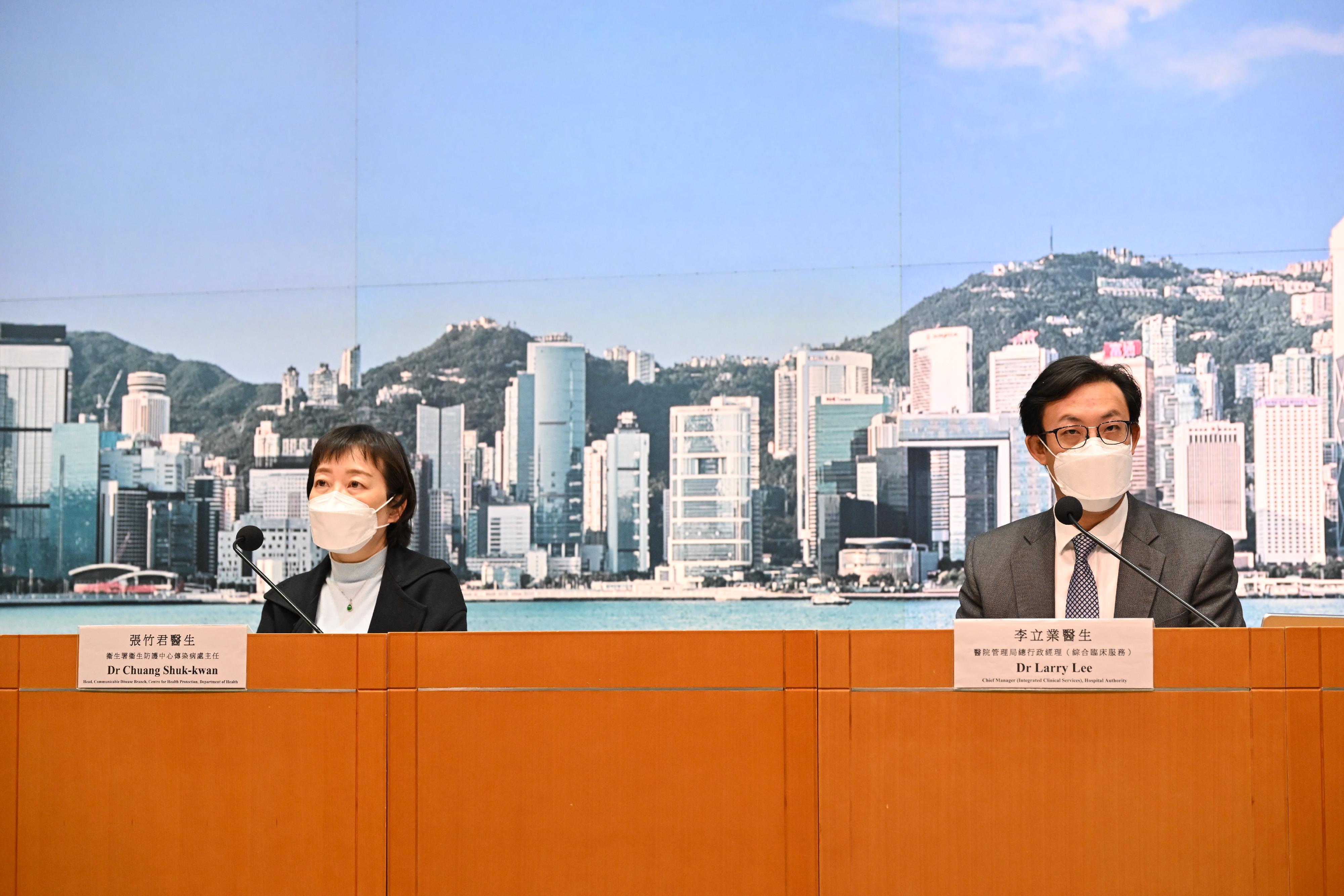CHP investigates 1 124 confirmed and 1 091 asymptomatic additional SARS-CoV-2 virus cases with 2 308 cases pending status by nucleic acid tests as well as 9 545 cases tested positive by rapid antigen tests (with photo)
The Centre for Health Protection (CHP) of the Department of Health (DH) today (March 21) announced the latest epidemic situation of COVID-19. As of 0.00am, March 21, the CHP was investigating 4 523 additional cases that tested positive for the SARS-CoV-2 virus by nucleic acid tests (1 124 confirmed cases, 1 091 asymptomatic cases and 2 308 cases with pending case status) in the past 24 hours. Separately, 9 545 additional positive cases through rapid antigen tests (RAT) (6 188 symptomatic cases and 3 357 asymptomatic cases) were reported. Hong Kong has recorded a total of 696 606 and 365 152 cases that tested positive by nucleic acid tests and RAT respectively for the SARS-CoV-2 virus so far.
The aforementioned newly reported cases consist of five imported cases and 4 518 locally acquired cases tested positive by nucleic acid tests, as well as 9 545 locally acquired cases tested positive by RAT. The CHP is continuing with epidemiological investigations on the cases. A list of buildings related to the cases is available at the “COVID-19 Thematic Website” (www.coronavirus.gov.hk).
In addition, as of 0.00am, March 21, a total of 5 906 deaths that have been tested positive for the SARS-CoV-2 virus during the fifth wave (since December 31, 2021) was recorded, with 5 879 and 27 deaths reported from the Hospital Authority and public mortuaries respectively. Hong Kong has so far recorded a total of 6 119 deaths that have been tested positive for the SARS-CoV-2 virus.
Furthermore, among the earlier cases by nucleic acid tests reported, there were cases (including pending cases) changed to confirmed, asymptomatic or re-positive cases. As at yesterday (March 20), the total number of confirmed cases was 277 061, while the figures for asymptomatic cases, re-positive cases, pending/unknown cases recorded since January 1 were 139 313, 10 and 275 699 respectively.
As a passenger flight (TK083) operated by Turkish Airlines arriving in Hong Kong from Istanbul, Turkey, on March 20 had three passengers who tested positive upon arrival, the DH thus invoked the Prevention and Control of Disease (Regulation of Cross-boundary Conveyances and Travellers) Regulation (Cap. 599H) to prohibit the landing of passenger flights in Hong Kong from Istanbul operated by Turkish Airlines from March 22 to April 4.
The spokesman for the CHP stressed that the local situation of COVID-19 infection became severe recently and there is a continuous increase in the number of cases involving mutant strains that carry higher transmissibility. With the higher transmissibility and risk of infection of the Omicron mutant strain, the CHP strongly appeals to the community to continue to comply with the social distancing measures, avoid going out and refrain from participating in unnecessary or crowded activities or gatherings (particularly religious or cross-family activities and gatherings). This would lower the risk of infection and prevent the virus from spreading in the community.
​​​The spokesman reminded that COVID-19 vaccines are highly effective in preventing severe cases and deaths from the SARS-CoV-2 virus. They can provide effective protection to those vaccinated in preventing serious complications and even death after infection. People who are yet to receive vaccination, especially senior citizens, chronic patients and other immunocompromised persons who face a higher chance of death after COVID-19 infection, should get vaccinated as early as possible for self-protection and to reduce the risk of falling seriously ill and death should they get infected. Meanwhile, a person who gets COVID-19 and influenza at the same time may be more seriously ill and would have a higher risk of death. Influenza vaccination may reduce the likelihood of hospitalisation and the length of stay. In addition, seasonal influenza vaccination is recommended for all persons aged 6 months or above except those with known contraindications. Persons at higher risk of getting influenza and its complications, including the elderly and children, should receive seasonal influenza vaccination early. Please see details of the vaccination schemes on the CHP’s website (www.chp.gov.hk/en/features/17980.html).


